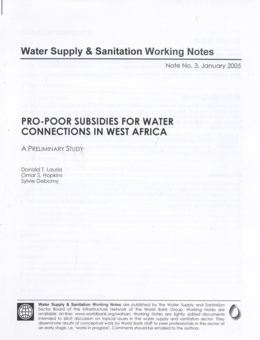|
 The Bank-Netherlands Water Partnership project aims at assessing the subsidy schemes in Senegal and Cote d’Ivoire for providing piped water to the poor. This study was commissioned to make a preliminary evaluation of the schemes in Dakar (in Senegal) and Abidjan (in Cote d’Ivoire). The fieldwork (April 22 through May 5, 2002) was made to explore whether those social connection programs might merit further study for application in other developing countries. The objectives was to examine how well the schemes in West Africa for making social and ordinary connections are working. A social connection, aimed at the poor, is free, whereas an ordinary connection, aimed at wealthier households, must be paid for. Table of Contents: Executive Summary 1. Introduction 2. Criteria for Social Connections 3. Pro-Poor Subsidies 4. Urban Water Supply in Dakar 5. Performance of The Social Connection Programs 6. Evaluation of The Social Connection Programs 7. Discussion and Recommendations Annexes Post Date : 30 Juni 2009 |